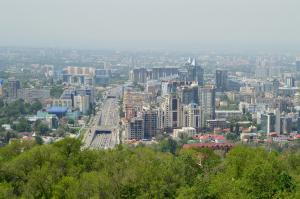
Four decades of experience under the UNECE Convention on Long-range Transboundary Air Pollution (Air Convention) have demonstrated that ratification and implementation of the Convention and its protocols reduces health and environmental impacts in a more cost-effective way than unilateral action by one country alone. This also creates economic benefits as harmonized legislation and standards across borders can introduce a level playing field for industry across countries and prevent Parties from competing with each other at the expense of the environment and our health.
One of the priorities for the Convention in recent years has been to encourage the ratification and to strengthen the implementation of the Convention and its protocols, targeting Parties from Eastern Europe, the Caucasus and Central Asia. In this regard, UNECE organized this week (12 July 2021) an online national roundtable and awareness-raising event to discuss domestic law on air pollution control in Kazakhstan.
The purpose of the event was to raise the political profile of the Convention and increase awareness of the benefits of accession to its Protocols and to further assist Kazakhstan in aligning national legislation with the provisions of the Protocols and determining the next steps towards ratification.
High-level participants from the Ministry of Ecology, Geology and Natural Resources of the Republic of Kazakhstan and other Ministries as well as representatives from the private sector and civil society discussed the results of a cost-benefit analysis, which showed the needed investments and the avoided costs in the health sector as a result of reduced air pollution. Participants also discussed the recommendations on the steps towards ratification of the key protocols of the Convention. The event was timely as the new Environmental Code of Kazakhstan entered into force in July 2021, providing a strategic opportunity to reform the country’s air quality management system.
Participants agreed that there were synergies between the Convention protocols and the new Environmental Code, specifically as regards the requirement on implementing Best Available Techniques, which should facilitate the ratification of the Convention’s key protocols in the near future. Ratification of the key protocols therefore comes within reach with the current legislation and is projected to lead to economic benefits as a result of prevented premature deaths and increased labour productivity.
The only binding treaty of its kind to tackle air pollution on a broad regional basis, the achievements of the Convention in the UNECE region over the last 4 decades have been no less than remarkable: air pollution trends and economic growth have been decoupled. Emissions of harmful substances including particulate matter and sulphur have been cut by 30-80% since 1990 in Europe and 30-40% in North America. This has led to healthier forest soils and lakes. In Europe, these measures account for 1 additional year of life expectancy and prevent 600,000 premature deaths annually.
The Convention’s amended Gothenburg Protocol, in force since 2019, is an example of how reducing classical air pollutants, such as Sulphur, and short-lived climate pollutants, such as black carbon, which is a major component of fine particulate matter, can be integrated into one, legally binding, instrument.

